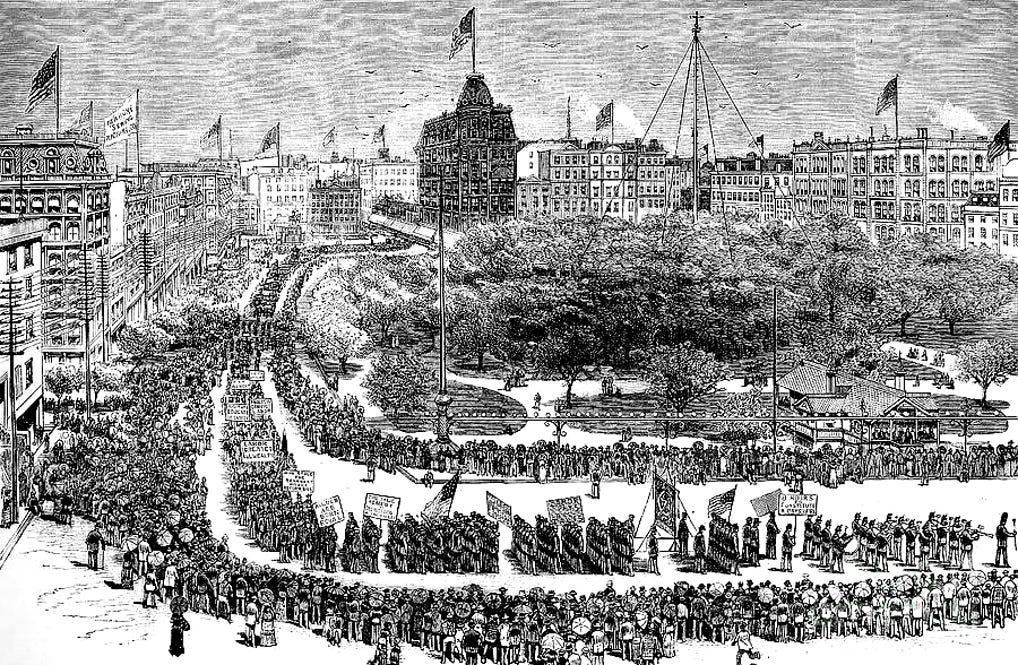Why is Labor Day in the U.S. and Canada in September instead of May 1st?
This is your last chance for your Labor Day special discount for a subscription to the Planet!
Today, it is Labor Day in Canada and the U.S. Many of you will celebrate this as a last nice summer day before going back to work or your study, and you probably won't give a thought to the historical significance of this day.
Before I dive into history:
Today is your last chance to subscribe to this newsletter with a special 20% Labor Day discount for the first 12 months. It gives you the whole experience: you get all articles, the possibility to comment, and full access to the archive.
All that for less than one dollar per week!
Yesterday, some of you used this opportunity to give a subscription to family members; perhaps you know someone in your family that would like to read The Planet?
In true Labor Day spirit: this is your chance to give fair payment to the writer of this newsletter. And as you can see, I don't strike on Labor Day; I am writing for you right now.
Now back to the history of Labor Day:
I wondered why Labor Day is celebrated in North America in September, while much of the world celebrates it in May. For that, we have to go back to the events on Chicago's Haymarket, on May 4th, 1886. The previous day, the police had come to the help of strikebreakers and intimidated the strikers for an eight-hour working day, killing one person and injuring several others. These events led to a peaceful protest the next day. However, after most people left, someone who was never identified threw a bomb, which led to a random police fire, and several police officers and demonstrators lost their lives.
The authorities responded by arresting the 'Chicago-eight,' hanging four of them, and one had committed suicide. There was no proof for their involvement, and many had not even been present at Haymarket on May 4th. Three years later, the Second International designated May 1st as International Worker's Day.
The first American Labor parade
The Haymarket affair was not the first organized labor protest. Since the early 1880's strikes against the dangerous working conditions and the long hours became more common. Four years before the events in Chicago, some 10,000 to 20,000 workers joined the first American Labor parade in Lower Manhattan on September 5th, 1882. The New York Tribune reported about this historic event in the following words:
'The men who took part in the labor parade generally appeared to be persons of no small intelligence. They were neatly dressed, and carried themselves well. It is to be regretted that these men can be governed by such persons as their present leaders. The latter are demagogues of the worst kind, who persuade their followers into all kinds of scrapers.
They are enabled to do this in great measure because the intelligent and sensible members of the classes which are employed at manual labor kept at work and have no time to act as leaders. They unfortunately delegate that duty to the lazy fellows who would rather live by their wits than by honest tell. It is a pity that the workingmen allow themselves to be so cheapened.'
May 1st or September?
So in the late 1880s, there were two kinds of Labor Day events. Labor organizers and socialists in many countries worldwide began celebrating May 1st as Workers Day, a day associated with the events at the Chicago Haymarket. The U.S. government was not very enthusiastic about the idea to annually highlight this massacre. Therefore, it opted in 1894 for the first Monday in September, which had its roots in the 1882 parade in New York City. A growing number of American cities and states had by then already recognized Labor Day.
Since then, the May 1st Labor Day celebrations have been more communist/socialist and activistic. You will surely remember the pictures of the May 1st parades on Moscow's Red Square and perhaps the demonstrations you still see in many European capitals. In contrast, the North-American Labor Day is, for most people, still a bit like the words used in the 1880s: a "workingmen's holiday."
The same year that the U.S. recognized Labor Day, Canada decided to move its Labor Day to the fall. Until then, Canada had been celebrating Labor Day in the spring, a tradition that can be traced back to April 15th, 1872, when the Toronto Trades Assembly organized Canada's first significant demonstration for worker's rights.
Don’t forget to subscribe today; make use of the Labor Day discount:
Notes:
https://www.boweryboyshistory.com/2021/09/historic-or-disappointing-how-new-york.html
https://www.history.com/topics/holidays/labor-day-1
https://www.history.com/news/labor-day-pullman-railway-strike-origins
https://www.voanews.com/usa/why-american-labor-day-september
https://www.timeanddate.com/holidays/canada/labour-day
https://www.britannica.com/event/Haymarket-Affair
Illustration: Author not known, but more than 100 years old, Image edited, Public domain, via Wikimedia Commons







We also celebrate May Day in the US and Canada, but it is not an "official" day off. Agree about the more socialistic perspective. But, that comes up with Labor/Labour Day too, so... maybe we just needed a civic holiday off at the end of the summer, rather than another one in the same month as Victoria Day in Canada and Memorial Day in the US!
Interesting history lesson on Labor Day. I think most people just look at it as an extra day off, including myself 😊 if I worked in an industry where I had the day off. But I do appreciate the holiday pay 😁.